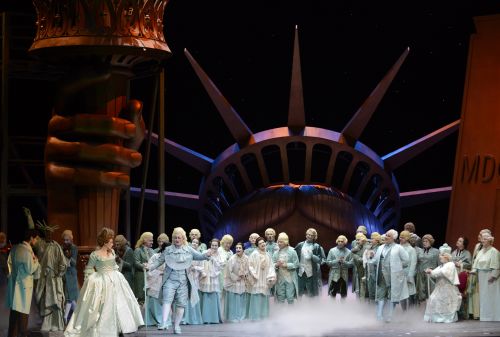 Germany Puccini: Manon Lescaut, Staatskapelle and Staatsoper Dresden, Pier Giorgio Morandi (conductor), Semperoper Dresden 18.6.2013 (JMI).
Germany Puccini: Manon Lescaut, Staatskapelle and Staatsoper Dresden, Pier Giorgio Morandi (conductor), Semperoper Dresden 18.6.2013 (JMI).
Production: Graz Opernhaus and Semperoper Dresden
Direction: Stefan Herheim
Sets: Heike Scheele
Costumes: Gesine Völlm
Lighting: Fabio Antoci
Cast:
Manon Lescaut: Norma Fantini
Des Grieux: Thiago Arancam
Lescaut: Markus Butter
Geronte: Maurizio Muraro

© Matthias Creutziger
My visit to Dresden came to an end in a rather disappointing way. The truth is that this performance of Manon Lescaut can be summarized in one word: boring. Puccini without emotion is unbearable.
The production bears the signature of Norwegian Stefan Herheim. He boasts a legion of fans who seem to compete among themselves in their praise for their idol. I do not always share the admiration for this director since I believe that his duty should be to narrate the story in an understandable manner. And if it is not easily understood, the blame should fall on the director, not on the opera goer.
One of the reasons for the failure of this performance is precisely the Herheim production: by offering his own interpretation he removes any hint of emotion. A central theme of the opera is the protagonists’ desire for liberty, a wish represented here by the Statue of Liberty which could be visited in Paris before France donated it to the United States in 1886. The start of the opera takes place, therefore, in the workshop where the Statue of Liberty is being built. Des Grieux appears to be its sculptor, and there are many visitors to the workshop, including Manon. The story that Herheim tells has little to do with Abbé Prévost’s or Puccini’s: here America represents a dream of freedom for Manon and des Grieux, but in the novel and in the opera the couple are deported by boat to Louisiana. They don’t go on a kind of pleasure cruise, as Herheim would have it. He also adds one more character to the plot: none other than Giacomo Puccini himself. Puccini directs the singers and lets them know which changes he has introduced in Prévost’s novel, a book that is almost continuously in the hands of the singers, who seem to be reading it when singing. The problem is that Puccini gets involved in the action, and thus Manon does not sing the aria Sola, perduta, abandonata to herselfbut to Puccini in his office. She dies finally not in des Grieux’s arms but in Puccini’s. Where? It’s supposed to be America, but there is no trace of the Louisiana “desert.” Emotion is never present here because everything is just pure playacting with Puccini as director.
To complicate matters Herheim creates a kind of puzzle with the costumes. In Act I the workers are dressed in 19th-century costumes, while visitors wear a mix of clothes from the 18th and 19th centuries. Des Grieux wears an 18th-century coat in Act 2, and ends up fully clothed in pre-French Revolution garb in Act 3. The lovers show up in America in different clothes. Who knows where in the desert they bought them.
I have enjoyed other Herheim productions, but not this one. I think the first obligation of any director should be to serve the opera. Here Herheim does not serve it, he just makes use of it.
Daniel Oren was announced as conductor, but he canceled and was replaced by Pier Giorgio Morandi, whose conducting was flat, superficial and routine. No objection can be made to the Staatskapelle Dresden, which was definitely the best element in the performance.
Manon Lescaut was sung by Norma Fantini, whose performance was short on excitement but with the notes in place. She is a solid soprano although I have never been truly moved by her singing.
Brazilian tenor Thiago Arancam made a poor des Grieux. His voice is rather artificial, with an ingolato sound both in the middle and at the bottom of the tessitura. His voice projected poorly and was continuously covered by the orchestra; the high notes were pushed and with dubious pitch. As an actor he simply overdoes it.
Markus Butter as Lescaut had a small voice that projected poorly. Maurizio Muraro was good as Geronte (at least we could hear him).
Semperoper was at about 95% of capacity. The audience was rather cold; I did not hear any cheers at the final bows, but rather some booing for Thiago Arancam.
Jose Mª. Irurzun